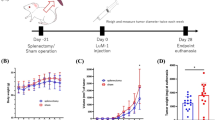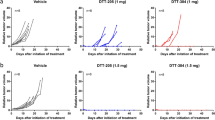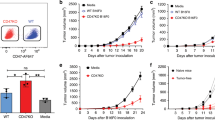Abstract
We examined the antitumor effects caused by murine colon carcinoma cells (Colon 26) transduced with interleukin-15 (IL-15) gene. Although the in vitro proliferation rate of IL-15-secreting Colon 26 (Colon 26/IL-15) cells was not different from that of wild-type (wt) cells, small subcutaneous tumors of Colon 26/IL-15 cells that developed in syngeneic immunocompetent mice regressed spontaneously in contrast to tumors of wt cells. The mice that had eliminated tumors of Colon 26/IL-15 cells rejected wt cells when subsequently challenged. The survival of the mice that had been inoculated intraperitoneally with Colon 26/IL-15 cells was significantly prolonged compared with that of the mice injected with wt cells. However, in an experimental lung metastasis model, the survival of the mice inoculated with Colon 26/IL-15 cells remained the same as that of the mice inoculated with wt cells. The inoculation of Colon 26/IL-15 cells into immunocompromised nude or severe combined immunodeficient mice produced tumors, but the survival of the immunocompromised mice was significantly longer than that of the mice inoculated with wt cells. The nude mice inoculated with Colon 26/IL-15 cells also survived longer than the severe combined immunodeficient mice with Colon 26/IL-15 cells. Depletion of natural killer cells in nude mice with anti-asialo GM1 antibody did not influence the survival of the mice injected with Colon 26/IL-15 cells. Immunohistological examination revealed that CD31+ cells migrated into tumors of Colon 26/IL-15 cells that developed in immunocompetent and immunocompromised mice. Taken together, our results indicate that an inoculation of IL-15-producing tumor cells can produce antitumor effects that are mediated by a variety of immunocompetent cells.
This is a preview of subscription content, access via your institution
Access options
Subscribe to this journal
Receive 12 print issues and online access
$259.00 per year
only $21.58 per issue
Buy this article
- Purchase on Springer Link
- Instant access to full article PDF
Prices may be subject to local taxes which are calculated during checkout
Similar content being viewed by others
Author information
Authors and Affiliations
Corresponding author
Rights and permissions
About this article
Cite this article
Tasaki, K., Yoshida, Y., Miyauchi, M. et al. Transduction of murine colon carcinoma cells with interleukin-15 gene induces antitumor effects in immunocompetent and immunocompromised hosts. Cancer Gene Ther 7, 255–261 (2000). https://doi.org/10.1038/sj.cgt.7700112
Received:
Accepted:
Published:
Issue Date:
DOI: https://doi.org/10.1038/sj.cgt.7700112



